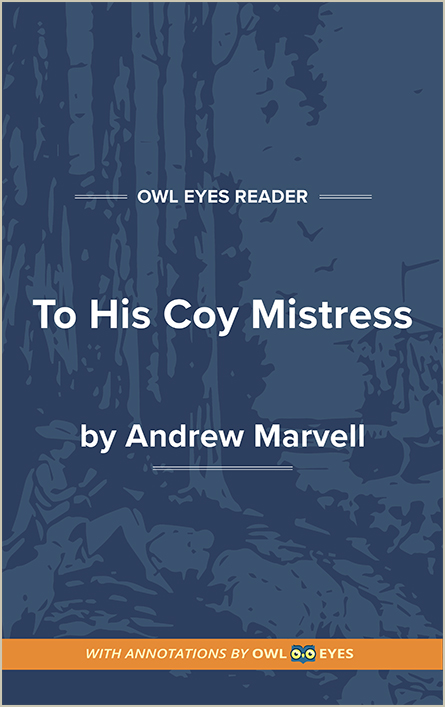Analysis Pages
Literary Devices in To His Coy Mistress
Tone and Enjambment: The poem opens with two closed couplets, or couplets which are formed by one full sentence. This adds a sense of urgency but also indicates a degree of thoughtfulness on the part of the speaker. For most of the first stanza, punctuation falls on the ends of lines, expressing a degree of controlled thought. However, moving into the second and third stanza, the poem begins to enjamb more frequently, with lines running into others and with punctuation becoming more scattered. The second and third stanza express the speaker’s mounting passion as well as the sense of urgency he is trying to create. This is demonstrated through the enhanced use of commas, which extend thoughts and give the stanzas a more stream-of-consciousness feeling.
Pronoun shift: In the final stanza, the speaker shifts away from first-person singular pronouns and instead begins utilizing first-person plural pronouns. The shift away from “thy” and “I” to “us” and “our” symbolizes the union between the speaker and his mistress in their metaphorical fight against time—as well as the more literal consummation of their love.
Meter and Rhyme: The poem is written in iambic tetrameter, a meter featuring four sets of two syllables per line for a total of eight syllables per line. It is structured as a series of rhyming couplets with a simple AABBCC rhyme scheme. The poem opens on two “closed couplets,” couplets representing a completed sentence, which give the poem a clipped but measured beginning. In the second stanza and continuing into the third, the line organization becomes increasingly erratic— the punctuation shifts from periods and semicolons to commas—giving the poem a rushed feel and possibly modeling the speaker’s increasing passion as he speaks. Marvell also flexes some of the pronunciations (e.g. rhyming “lie” and “eternity”) in order to fit the rhyme scheme.
Literary Devices Examples in To His Coy Mistress:
Text of the Poem
🔒"Now let us..." See in text (Text of the Poem)
"like amorous birds of prey..." See in text (Text of the Poem)
"the Flood, And you should, if you please, refuse Till the conversion of the Jews...." See in text (Text of the Poem)
"The grave’s a fine and private place, But none, I think, do there embrace...." See in text (Text of the Poem)
"worms..." See in text (Text of the Poem)
"Time’s wingèd chariot..." See in text (Text of the Poem)
"We would sit down and think which way To walk and pass our long love’s day...." See in text (Text of the Poem)

